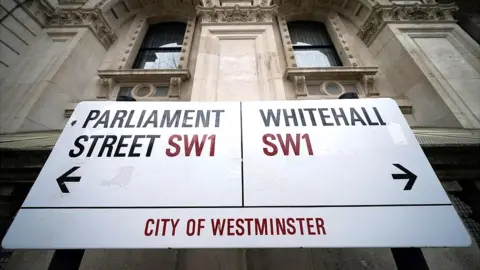Dominic Raab: Anger from civil servants at resignation letter
 PA Media
PA MediaThe investigation into bullying allegations against Dominic Raab has taken months - and the impact on some of those who have been involved in some form or another has been immense.
For BBC Newsnight, I've been speaking to former and current civil servants, some of whom have worked closely with Mr Raab at one point or another in the various departments he has led, although they were not complainants in the inquiry.
As they learned of his resignation as justice secretary and deputy prime minister, my WhatsApp went a bit crazy. The buzz word was "relief" that he had stepped down.
But there was also anger, with one former senior civil servant telling me, after reading his resignation letter, that his exit was "entirely consistently with how he led the department".
They went on to say "the inference one has to draw from his statement about setting standards is that previous justice secretaries and deputy prime ministers (none of whom have faced anything like the scale of criticism as Raab) were less able to achieve success through more reasonable and respectful dialogue with civil servants".
"It's perhaps of note from his letter that he feels there are different, perhaps acceptable thresholds of bullying, which perhaps says all it needs to say about this whole fiasco," they add.
The inquiry's report found Mr Raab acted in an "intimidating" and "aggressive" way with officials.
While he was foreign secretary it also said he committed an "abuse or misuse of power" and that his conduct was "humiliating" for the individual affected.
In his resignation letter, Mr Raab says he feels "duty bound" to accept the outcome of the inquiry but describes its findings as "flawed".
 Getty Images
Getty ImagesHe argues ministers must be able to give "direct critical feedback" to senior officials "in order to set the standards and drive the reform the public expect of us".
Another former civil servant who worked closely with Mr Raab says his resignation letter tells you "everything you need to know" about his character.
"I'm sure everyone who worked for him will note the irony of his point that ministers must be able to give direct critical feedback, when feedback was the very thing many officials felt too intimidated to give to him for fear of his reaction."
'Non-apology'
Someone who advised Mr Raab at a senior level is equally damning.
"Whilst the letter contains an apology, it's one of the best examples of a 'non-apology' from a minister in recent years," they say.
"Raab's version of a secretary of state and deputy prime minister is one that should be learnt from and ultimately consigned to the history books.
"The level of relief from hard-working civil servants who can now, under new leadership, get on with the challenging and important jobs they signed up to do, is palpable."
In response to Mr Rabb blaming "activist civil servants" for blocking reforms, one former senior civil servant who worked closely with him told me: "Raab has often publicly praised the work of his civil servants so this seems to be at odds with his previous statements."
Another ex-senior civil servant who worked under Mr Raab said in their experience most are in the job because they want to deliver for the public and they do this through a normally very effective relationship with ministers.
"I think you'd struggle to find a similar example of the disfunction we've heard about in Tolley's report, so it's perhaps fair to draw the conclusion that there is one common thread to this unique situation - and that's Raab," they added.
However, others who worked closely with Mr Raab have defended him.
One senior civil servant says while some of the behaviour highlighted in the report resonated, they had never had an issue with it.
"He is highly demanding, he is direct, one of the things he hates most is wasting time. He wants people to be direct, concise, to the point, action-driven," they say.
"He works very hard. He expects those around him to match that endeavour. He has a very low threshold for people not pulling their weight. That is the least the taxpayer should demand of the civil service."
Mr Raab says the inquiry has set a "dangerous precedent", with the threshold for bullying set "so low" it could encourage "spurious complaints" and "have a chilling effect on those driving change".
This raises interesting questions about the future relationships between civil servants and ministers and is likely to throw the spotlight on behaviour and conduct in politics.
Additional reporting by Ione Wells and Becky Morton
